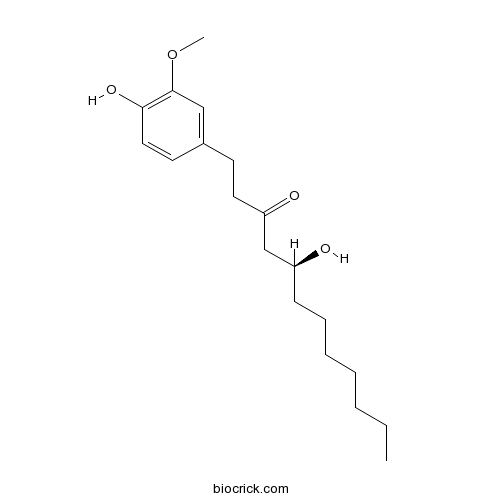8-Gingerol is one of the principal components of ginger, which is widely used in China and elsewhere as a food, spice and herb, shows immunosuppressive activity on the immune responses to ovalbumin (OVA) in mice, 8-gingerol suppressed lipopolysaccharide (LPS) and concanavalin A (ConA)-stimulated splenocyte proliferation in vitro. [1]
8-Gingerol suppresses cellular tyrosinase activity and decrease melanin content, inhibits the expression of MC1R, MITF, tyrosinase, TRP1 and TRP2, decreases intracellular RS and ROS levels in B16F10 and B16F1 cells, inhibits melanogenesis by down-regulation of MAPK, PKA signaling pathway; it could be used as an effective skin-whitening agent.[2]
8-Gingerol has inhibition of T lymphocyte proliferation and cytokine synthesis.[3]
8-Gingerol has anti-oxidant and anti-inflammatory activities.[4]
English website: 8-Gingerol
Japanese website: 8-Gingerol
Chinese website: 8-Gingerol
[1] Lu J, Guan S, Shen X, et al. Molecules, 2011, 16(3):2636-45.
[2] Huang H C, Chou Y C, Wu C Y, et al. Biochem Biophyl Res Co, 2013, 438(2):375-81.
[3] Bernard M, Furlong S J, Coombs M R P, et al. Phytother Res, 2015, 29(11):1707–13.
[4] Dugasani S, Pichika M R, Nadarajah V D, et al. J Ethnopharmacol, 2009, 127(2):515-20.
[5] Bensoussan A, Lee S, Khoo C, et al. J Aoac Int, 2007,90(5):1219-26.



